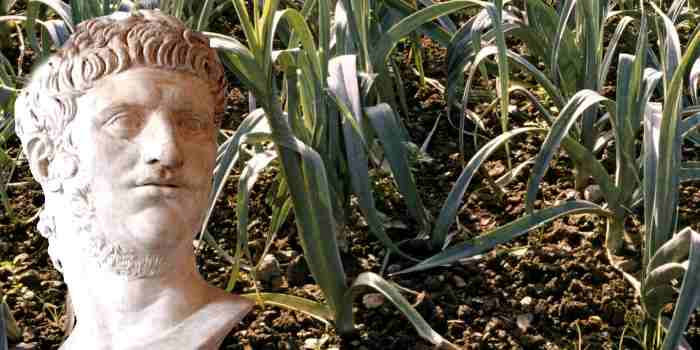By Wes Porter ——Bio and Archives--April 8, 2024
Lifestyles | CFP Comments | Reader Friendly | Subscribe | Email Us

Roman poet and satirist Martial, referring to the disagreeable effects of leek upon the breath of the eater, suggested:
The juice of the leek who fondly sips,
To kiss the fair, must close his lips.
Fortunately for him, the Emperor Nero was dead before Martial’s Epigrams were published about 86 A.D. According to Pliny, Nero brought leeks into great repute among the Romans by eating them with oil to clear his voice for singing. Hence, the satirical name of leek eater – porrophgus. Neither this nor his other practices endeared him to the elite of Roman society. On 6 June 68 AD, threatened with assignation, he was killed by his private secretary Epaphroditus obeying Nero’s orders. “Qualis artifex pereo” – “What an artist dies with me,” he is reputed to have said..
Earlier, we learn from Biblical commentators that the leek, as well as the onion and garlic, was included among those Egyptian luxuries after which the Children of Israel pined while trekking across the wilderness.
Modern botanical thought veers toward Allium ampeloprasum, considering it synonymous with the older A. porrum. This is not the only problem about the leek. To the distress of northern gardeners, it requires an extended growing season, 120 to 150 days from emerging from seed. Home gardeners with a short growing season must, perforce, start their leeks indoors several weeks early prior to planting out when both weather and soil are warmer.
In his exhaustive Natural History, Pliny offers both good and bad advice:
It is a remarkable fact, that, though the leek stands in need of manure and a rich soil, it has a particular aversion to water; and yet its nature depends very much upon the natural properties of the soil.
He is correct in the matter of soil and organic additives, but wrong as to moisture. Leeks, in fact, stand in need of constant moist conditions, being shallow rooted.
Unlike the globular onion, the aim with the leek is to produce a long, tightly bunched leaf sheath, white in the lower portion. Either of two methods can be adopted to attain this. Either slowly earthing up the plants as they mature, or growing them in a trench and filling soil around them as the season progresses.
Gardeners of by-gone days would cut the leaves of the leek as it grew, the object being to increase the size of the stalk. Suffice to say they were mistaken. Pliny also records that, well before his day, “The ancients were in the habit of placing a stone or potsherd upon the leek, to make the head grow all the larger,” but this was no longer the practice.
Another odd belief from Roman times was the belief that drinking the juice of leeks would cause instance death. It is, of course, quite harmless. As for Nero’s prejudice in favour of the leek, as French botanist Fée noted, such still existed in 19th century France. He expressed doubt, however, as to whether mucilage of leek has any beneficial effect upon the voice.
Support Canada Free Press

The leek is perhaps better famed today as the national emblem of the Welsh, worn in their caps on St. David’s Day, 1st March. Shakespeare utilized the ancient tradition in his play Henry V, where the braggart Pistil, following insulting the Welshman Fluellen is buffeted and forced to eat the vegetable symbol of Welsh valour.
‘Leek’ derives from the Old English lēac, meaning ‘onion.’ The modern ‘leek’ is a homonym, so giving rise as many similar-sounding words do, to humorous opportunities. Long had the supermarket staff sought to detain a shoplifter. Finally success was achieved when he stopped in the produce department to take a leek.
Competitions for the longest leek have a history dating back to at least 19th-cenury northern England. At the time of writing the record stands at 143.2 centimetres (4 feet 8.3 inches) by gardener Derek Hulme of Stoke-on-Trent, UK in 2022. Shakespeare’s Pistol would have surely gagged on that.
View Comments
Wes Porter is a horticultural consultant and writer based in Toronto. Wes has over 40 years of experience in both temperate and tropical horticulture from three continents.